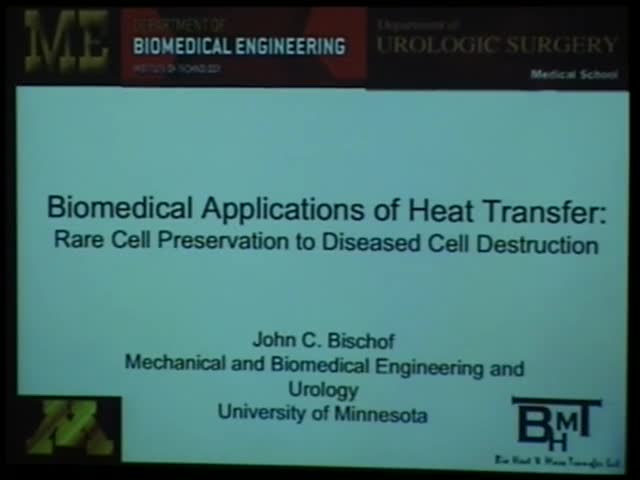Biomedical applications of heat transfer: Rare cell preservation to diseased cell destruction
Presenter
September 14, 2010
Keywords:
- Heat transfer
MSC:
- 80A20
Abstract
Heat transfer plays a crucial role in many biomedical applications in cryobiology (biopreservation and cryosurgery) and hyperthermic biology (thermal therapies). In these applications, thermal excursions are used to selectively preserve or destroy cells and tissues. Biopreservation is an enabling technology to many biomedical fields including cell and tissue banking, cell therapeutics, tissue engineering, organ transplantation and assisted reproductive technologies. Thermal therapies including cryosurgery are increasingly important in all surgical sub-specialties for minimally invasive thermal destruction of tissues for cancer and cardiovascular disease treatment. In this talk work predominantly from our lab will be reviewed focusing on cellular and molecular phenomena that are important in defining outcomes of both cryobiological and hyperthermic biomedical applications. During these applications microscale cellular phenomena linked to viability are mechanistically shown to depend on the heat transfer process in vitro. These events include: cellular dehydration, intracellular ice formation, and membrane hyperpermeability and blebbing. In addition, new approaches to assess molecular targets of heating and cooling using calorimetric and spectroscopic methods (i.e. lipid hydration, protein denaturation and solute segregation) will be discussed. In vivo, new approaches will be reviewed to define gene regulated events (inflammation and apoptosis) and control them with targeted adjuvants such as TNF-a for cancer treatments. Finally, recent work will be reviewed with nanoparticles showing their dramatic potential to both enhance and control thermal therapy outcomes through adjuvant (drug) delivery, and laser and inductive (RF) heating within the body.
Bio:
John Bischof is a Professor in the Department of Mechanical Engineering with joint appointments in Biomedical Engineering and Urologic Surgery at the University of Minnesota. Dr. Bischof received his B.S. in Bioengineering from U.C. Berkeley (UCB) an M.S. from UCB and U.C. San Francisco in 1989, and a Ph.D. in Mechanical Engineering from UCB in 1992. After a Post-doctoral Fellowship at Harvard in what is now the Center for Engineering in Medicine, he joined the University of Minnesota in 1993. Professor Bischof is an author on numerous peer-reviewed publications; he has several patents filed or issued and numerous best paper, young investigator and society Fellow awards for his work in bioheat and mass transfer. He currently holds a Distinguished McKnight University Professorship at the University of Minnesota.
